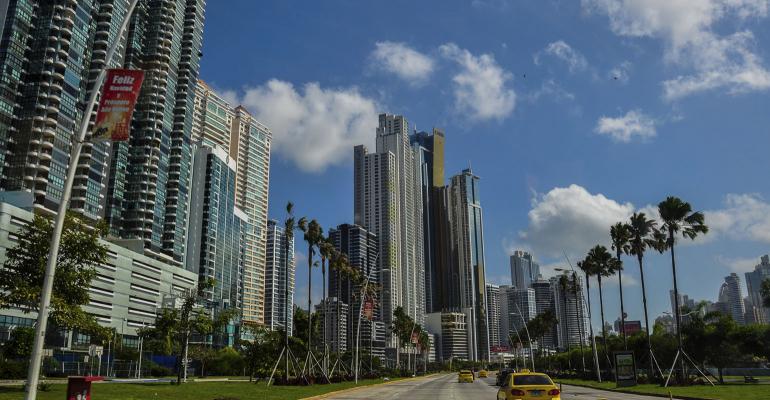(Bloomberg) -- Panama and the U.S. have at least one thing in common: Neither has agreed to new international standards to make it harder for tax evaders and money launderers to hide their money.
Over the past several years, amid increased scrutiny by journalists, regulators and law enforcers, the global tax-haven landscape has shifted. In an effort to catch tax dodgers, almost 100 countries and other jurisdictions have agreed since 2014 to impose new disclosure requirements for bank accounts, trusts and some other investments held by international customers -- standards issued by the Organization for Economic Cooperation and Development, a government-funded international policy group.
Places like Switzerland and Bermuda are agreeing, at least in principle, to share bank account information with tax authorities in other countries. Only a handful of nations have declined to sign on. The most prominent is the U.S. Another, Panama, is at the center of a storm over tax evasion and global cash flight that broke out over the weekend.
A law firm there helped set up tens of thousands of shell companies, according to a report by the International Consortium of Investigative Journalists. ICIJ and other news organizations published reports they said showed global efforts to hide wealth, undertaken by global politicians and the ultra-rich, with the aid of banks and lawyers. The central tool: shell companies that people used to shield the identity of the owners’ assets. While such structures can be legal, they can also support efforts to avoid taxes.
U.S. Secrecy
The latest reporting "underscores the secrecy in Panama," said Stefanie Ostfeld, the acting head of the U.S. office of the anti-corruption group Global Witness. "What’s lesser known, is the U.S. is just as big a secrecy jurisdiction as so many of these Caribbean countries and Panama. We should not want to be the playground for the world’s dirty money, which is what we are right now."
Advisers around the world are increasingly using the U.S. resistance to the OECD’s standards as a marketing tool -- attracting overseas money to U.S. state-level tax and secrecy havens like Nevada and South Dakota, potentially keeping it hidden from their home governments.
Last month, members of Congress in both the House and Senate introduced bills to require disclosure of the true owners of U.S. companies, an effort to crack down on money laundering and tax evasion.
In 2010, Congress passed the Foreign Account Tax Compliance Act, or Fatca, as the U.S. Justice Department began prosecuting Swiss banks for enabling tax evasion. Fatca forces certain financial firms to disclose to the Internal Revenue Service any foreign accounts held by U.S. citizens.
Fatca doesn’t, however, bind banks to provide information on foreigners with U.S. accounts to regulators abroad. The U.S. has entered into agreements with some other countries requiring such exchange with foreign regulators, but tax planners say they are considered relatively easy to avoid.
That’s where the OECD came in, with its own international take on Fatca that the U.S. declined to sign.
Panama’s Conditions
Panama, for its part, committed to the OECD standard in November. But the country attached a number of conditions, which many advisers viewed as undermining its position.
In a January interview, an official at Trident Trust Co., a big provider of offshore vehicles, said it was seeing a large number of accounts moving into Panama because of its weak commitment to the OECD regulations. "The Panama office was extremely overworked, because a lot of people are re-domiciling to Panama from BVI and Cayman," said Alice Rokahr, a Trident official based in South Dakota.
In late February, OECD officials said publicly that Panama had been "removed from the list of committed jurisdictions" that agreed to share information.
The latest coverage of shell companies created by a Panamanian law firm could give the OECD new ammunition to put pressure on the country to sign onto the information-sharing agreements, some tax experts said.
"The U.S. doesn’t follow a lot of the international standards, and because of its political power, it’s able to continue," said Bruce Zagaris an attorney at Berliner Corcoran & Rowe LLP who specializes in international tax and money laundering regulations. "It’s basically the only country that can continue to do that. Others like Panama have tried, but Panama can’t punch as high as the U.S."
Indeed, in a statement issued Monday by OECD secretary general Angel Gurria, the OECD said "Panama is the last major holdout that continues to allow funds to be hidden offshore from tax and law-enforcement authorities."
The statement didn’t mention the U.S., which is the OECD’s largest funder.
Pascal Saint-Amans, the OECD’s tax policy director, said the two countries weren’t comparable, as the U.S. regularly provides information to regulators and law enforcers in other countries, even if it hasn’t signed onto the OECD standard.
"The politics are favorable to the U.S. and unfavorable to Panama," Zagaris said.





